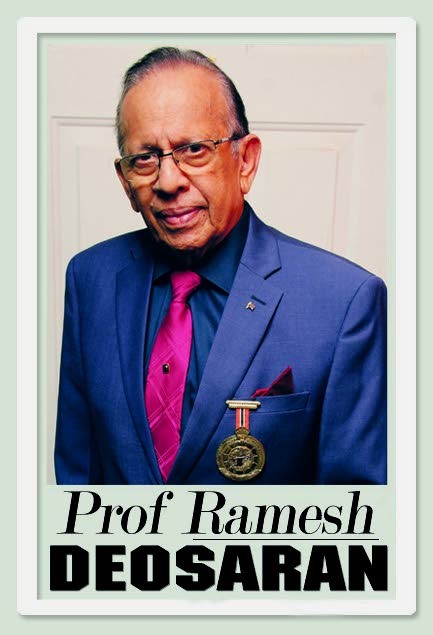National government for ethnic unity

While Tobago repeatedly seeks “more self-government,” Trinidad has a bigger, more complex problem – the problem of prolonged, protracted ethnic disunity, which continuously handicaps improved governance and equitable distribution of state resources.
As the Tobago calypsonian said, “It is politics in the way.” Party politics, more precisely, with its entrenched favouritism, abuse of power and that subversive, lingering “fear of the other.”
Where, out of this, are the vision, the big ideas, the message of inspiration for the future? For the children?
Last Independence day, PM Dr Rowley, asking citizens to “look inward,” said: “Some citizens have been complaining that they feel far removed from ‘the government’ and overall, they hold a sense of being removed and excluded.”
He correctly added: “We as legislators must now acknowledge that there are many citizens who feel marginalised, even so alienated…We need to reach out and give them hope.”
Can this be done with the embattled two-party system we have?
Opposition Leader Kamla Persad-Bissessar also said, “Since Independence, troublingly, we were derailed by mismanagement and corruption, pushed back down to Third World status.” Party politics?
We need to be “a model to the world,” she added.
Then President Christine Kangaloo advised: “No one but us can right our wrongs or remedy our problems.”
Well, let’s do it.
With political independence, this country remains a rigid clone of British institutions, political habits and thinking. We remain divided,with one “ethnic” group perceived as unfairly ruling over another.
Is this the natural way or an artificial political device, leaving the masses far behind, demoralised and languishing for basic services and equality of opportunity?
A multi-party system is the greatest threat to socio-economic equity. All our political leaders – even today’s PM and Ms Persad-Bissessar – appeal for national unity, but without the political instrument to achieve this.
One fundamental way is to share political power. We all know how difficult this is. But if there is a political and constitutional framework for common purpose, all to be on the same page, to share power and inspire socio-economic equity without regard to race, religion, class or geographical location, the persistent appeals for national unity would very likely be achieved and even become a model for small, multi-ethnic countries.
When Basdeo Panday became PM in 2000, he invited Opposition Leader Patrick Manning to form a “national government.” Manning refused.
Of course, while the constitutional framework was not there for this, Panday recognised that with our imbalanced multi-party system, social inequity and political discrimination would persist. He should have gone further.
The wise heads in the 1986 NAR coalition government should have made a similar offer to the PNM.
It’s time also for the venerable “win alone, lose alone” PNM to help save this country from deepening animosity, talent wastage and frustration. It may very well explode one day. (Imagine we still fighting governmentt for potholes, broken drains, against geographical discrimination, water and pavements.)
Our national talents are so inefficiently divided, one side fighting the other side, not trusting the others in power. Given the repeated, often bitter, complaints against social inequity and political discrimination, we ought to be courageous and enlightened enough by now to recognise that the system is not working – either for the elected partisan politicians or the people.
There is now pressing need to turn to the concept and practice of having a constitutionally-framed national government, one that brings disparate ethnic groups together, instead of fighting each other separately. Because there are political difficulties doesn’t mean we should not apply our intellectual resources and experience to work it out, even if it means having “one unified party.”
After long struggles with tribal and ethnic disunity, when Julius Kambarage Nyerere became President of independent Tanzania (1964-85), he developed
Ujamaa, which emphasised “economic co-operation, racial and tribal harmony and a moralistic self-sacrifice.”
He was educated in Scotland, knew about Westminster, but he also knew what was best for his own country. He gathered a group of honest, courageous and intellectually prepared men and women and strove to apply the
Ujamaa principles to national development.
National unity flows from the top. Recognising the political twists, turns and ambitions along the way, Nyerere and his bipartisan team adopted a one-party system where political competition and rotation occur within the party without disturbing the party’s obligation to serve all judiciously and equitably.
His service was recorded: “Under Nyerere leadership, TANU (Tanzanyika African National Union) espoused peaceful change, social equity, racial harmony and rejected tribalism and all forms of racial and ethnic discrimination.” It became a work in progress that required leaders with dedication and integrity.
How long are we prepared to live with our very troubling national disunity, partisan spite, victimisation and a government severely wounded by party politics?
This is really not democracy for all people. There is too much unhappiness, too much complaining, political grievances and partisan favouritism. We need to look hard at something else to save ourselves and the politicians too – a national government to serve all. Even if it requires one unified political party.


Comments
"National government for ethnic unity"